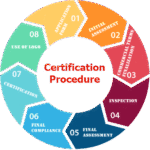Kosher Certification is a process that confirms a food product follows Jewish dietary laws, also known as kashrut. These laws outline which foods are permitted, how they should be prepared, and how they must be handled. For example, kosher laws prohibit mixing meat and dairy, and allow only certain animals and fish to be eaten. The rules are detailed and strictly followed by those who keep a kosher diet.
A kosher certification symbol on packaging—such as OU, OK, or Star-K—shows that the product has been reviewed and approved by a reliable kosher agency. These agencies inspect the ingredients, equipment, and production process to ensure everything meets kosher standards.
Why Kosher Certification Matters
While Kosher Certification is essential for people who follow Jewish dietary laws, its benefits go far beyond religion. Many consumers view kosher products as cleaner, safer, and more trustworthy due to the strict oversight involved. People with food allergies, dietary restrictions, or preferences for transparency often choose kosher-certified items.
For businesses, kosher certification offers access to new markets, including Jewish communities and international buyers. It also helps build trust with customers looking for high-quality, well-regulated food products.
How to Get Certified
To become Kosher Certification certified, a company must apply through a recognized kosher agency. The agency reviews all ingredients, suppliers, and processes, then conducts a facility inspection. If the product meets the standards, the company receives certification and can use the kosher symbol on packaging. Regular inspections are required to maintain certification.
In Summary:
Kosher Certification signals quality, safety, and trust. Whether you’re a consumer or a business, it offers clear benefits in today’s health-conscious and globally connected market.






